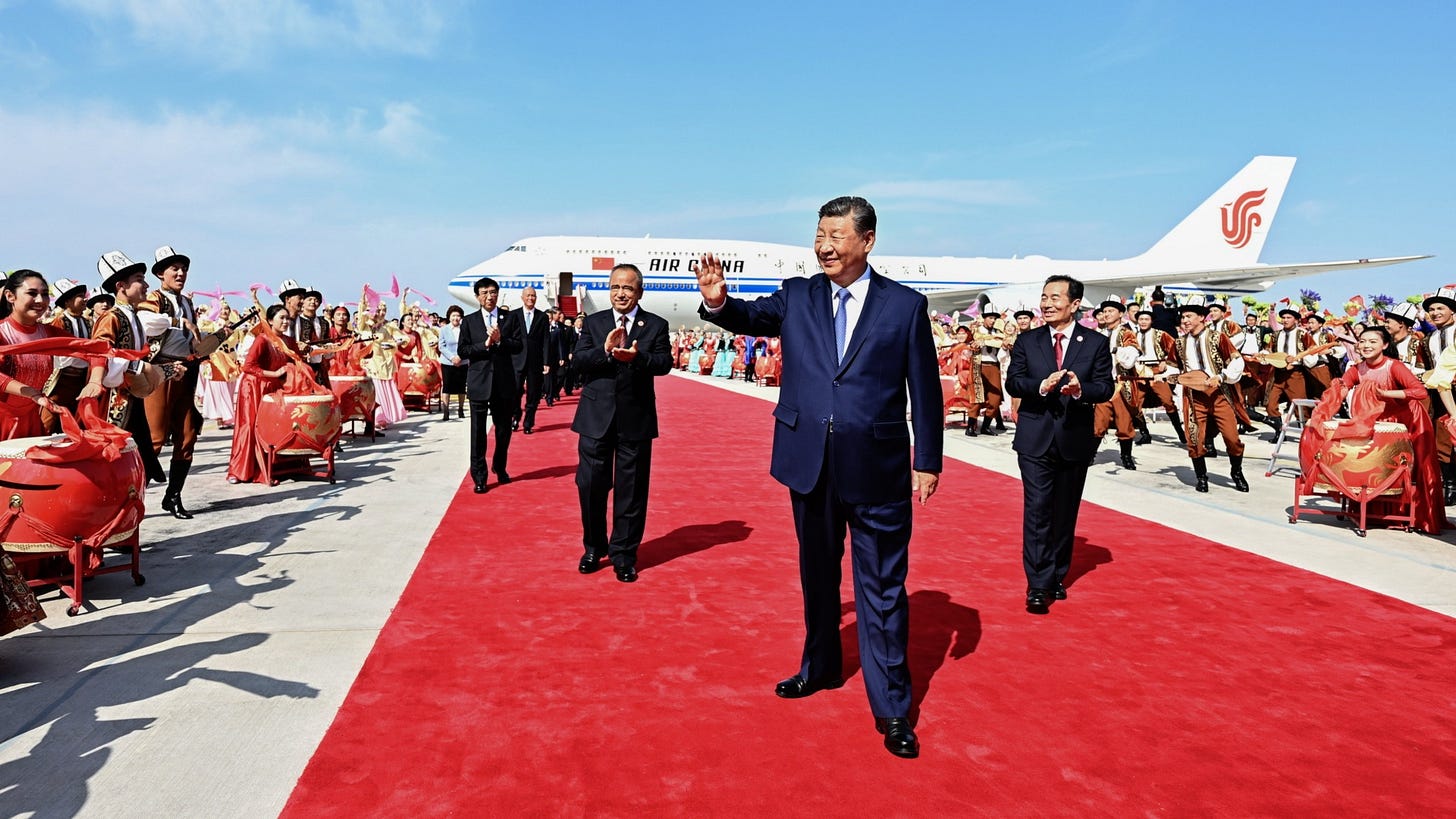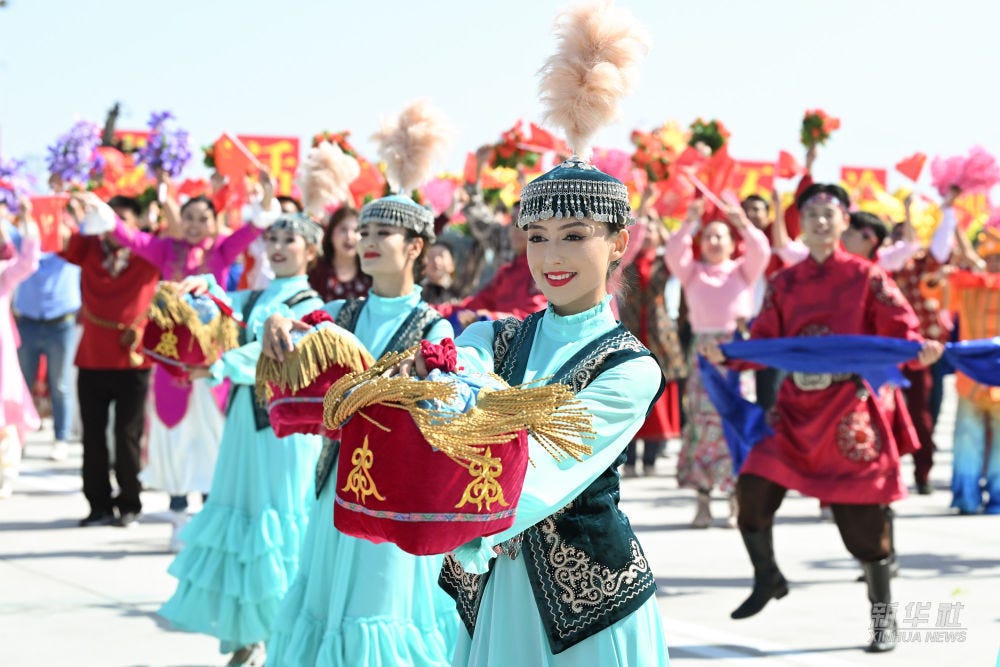‘Xinjiang policy is correct, scientific, and effective’ — Xi
Xi Jinping visits the Uyghur heartland, PR stunt gone wrong in Tibet, Jerome Cohen, law of the jungle, big WTO table, green commitments, four more years for citizen journalist.
Last week, I wrote that “there is no TikTok deal, no matter what Trump says.” On September 25, Trump signed an executive order approving a TikTok deal and declaring that the “divestiture outlined in the Framework Agreement…resolves the national security concerns.”
But here’s the thing: No one seems to have seen the text of any actual agreement on divestiture. And if I were making decisions in Beijing about TikTok, I would just keep stringing Trump along, exacting concessions, without committing to anything in black and white.
It’s very clear who really, really wants a TikTok deal, and it’s not anyone in China.
Which does not mean that some kind of China-U.S. trade deal is not coming. All the signs are there, judging by recent media stories, for example that the Chinese premier has signaled “a desire for stable U.S. relations,” and that U.S. and Chinese officials have agreed“to step up communications ahead of possible Trump-Xi summit.”
Update: The well-informed people at research firm Trivium believe the terms of the deal are already clear and that it will go ahead, (and that the terms “very much tilts in Beijing’s favor”).
—Jeremy Goldkorn
This is The China Week, a succinct summary and analysis of news from the People’s Republic Please take out a paying subscription to receive all full newsletters and access to the archive.

The ‘policy is correct, scientific, and effective’
Xi Jinping’s victory tour of Xinjiang
Xi Jinping and a group of senior Communist Party leaders visited Xinjiang from September 23 to 24 to celebrate the 70th anniversary of the founding of the Xinjiang Uyghur Autonomous Region (XUAR).
Xi was greeted at the airport of the provincial capital Ürümqi like an emperor by hundreds of dancers, musicians, and colorfully clothed people singing “Welcome, welcome, warmly welcome!” (Watch the video to get a sense of the spectacle.) This was a stark contrast to Xi’s reception on April 30, 2014, the final day of a four day visit to Xinjiang, when a bomb-and-knife attack killed 3 people, and injured 79 others in Ürümqi.
That attack was one of a spate of violent incidents in 2013 and 2014 blamed on Uyghur separatists. The attacks were the justification for Beijing’s subsequent campaign of mass detention and forced cultural assimilation of Uyghurs. Xi’s visit this week was a declaration that the campaign is seen in Beijing as a success, and that there is no intention to back down. As the People’s Daily put it “Xi: Xinjiang policy is correct, scientific, and effective.”
The Chinese Communist Part took over Xinjiang in 1949 and ruled it as a province. On October 1, 1955, it became the XUAR, following a Soviet model of granting nominal self-rule to minorities as a strategy to fulfill nationalist aspirations of minority groups while preventing real separatism. In recent years, Beijing has de-emphasized the notion of autonomy in favor of “forging a strong sense of Chinese national community.” Under this notion, Uyghur and other minority languages and religious practices are discouraged; what’s left is ethnic clothing, dancing, and music that is often used for propaganda.

See also:
New Xinjiang White Paper; Xi: Xinjiang policy is correct, scientific and effective / Tracking People’s Daily
Xi declares success in Chinese region at center of rights-abuse claims / Wall Street Journal
Xi to lead ceremony on 70 years of Uyghur subjugation: Timeline of major visits and meetings on Uyghur issues / Uyghur Times

Art for money’s sake goes wrong
PR disaster for artist Cai Guoqiang and Arc’teryx
Contemporary artist Cài Guóqiáng 蔡国强 is best known for his use of gunpowder to create both artworks and fireworks displays. Although he has lived mostly in Japan and the U.S. since the 1980s, he was warmly welcomed by China’s establishment when he was chosen to design the fireworks shows for then opening and closing of the 2008 Beijing Summer Olympics.
That naturally led to a variety of commercial opportunities, including a recent project sponsored by the outdoor apparel brand Arc’teryx, in which Cai set off fireworks on a Himalayan mountain in Tibet. (Arc’teryx is a Canadian subsidiary of Chinese sports conglomerate Anta.)
But there has been a loud consumer backlash against the stunt over environmental and cultural concerns. Internet users “began calling for a boycott of Arc’teryx, arguing that setting off fireworks in such a fragile alpine ecosystem risked disturbing wildlife, damaging slow-growing vegetation, and polluting the high-altitude environment,” according to research firm Baiguan, which notes that “many also criticized the spectacle as disrespectful to local traditions, which hold mountains as sacred and discourage loud disturbances.”
“Is this what contemporary art should be?” asks Tibetan writer Woeser: “What we see is arrogance masquerading as creativity, a display of vanity that treats Tibet’s mountains and rivers as props.”
On a different topic, but from the same part of the world:
The daring caper of a faithful Tibetan who outfoxed China / Wall Street Journal

In Memoriam Jerome A. Cohen
Jerome Cohen, a widely-loved and respected lawyer and law professor has died at the age of 95.
I last spoke to Jerome for this Sinica podcast on the Hong Kong protests and 2019 extradition bill. It was taped in front of a live audience October 2019, a few months before COVID hit. After the recording, my co-host Kaiser and I went out for a short walk through Manhattan and a fine Chinese dinner with Jerome and his wife. A lovely evening.
Obituaries and eulogies:
Jerome Cohen, the first American to practice law in China, dies at 95 / Wall Street Journal
“An expert on China—and a sometime critic—Cohen defended companies and dissidents”Xǔ Zhāngrùn 許章潤 mourns Jerome Cohen / China Heritage
In memoriam: Jerome A. Cohen (1930-2025) / NYU Law
There will be many more memories of Jerome published in the coming days, including at ChinaFile.


